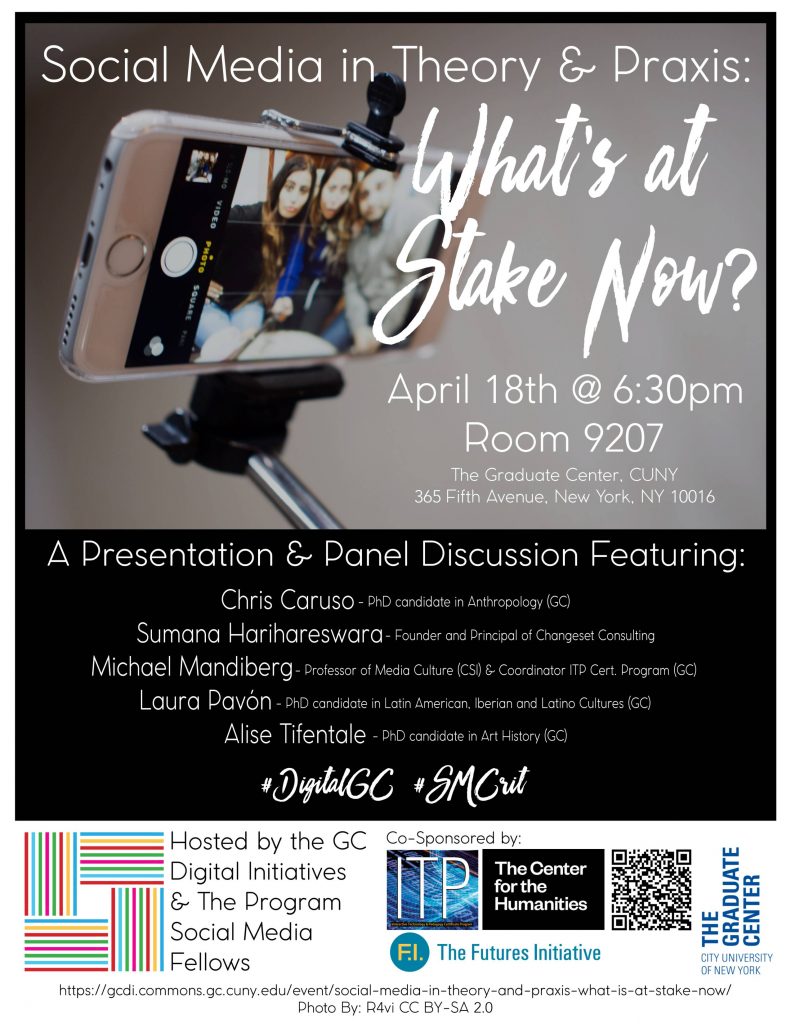With the rapid growth of social media outlets, its users have willfully shared personal information, most often unaware that in doing so they have allowed what they considered private to become public. Researchers interested in tapping into this information may ethically consider informed consent as a critical component of their scholarly work.
In anticipation of our upcoming panel discussion Social Media in Theory and Praxis: What is at Stake Now?, we wanted to highlight panel member Alise Tifentale, who will be giving her paper, “The Networked Camera: Mapping the Universe of Instagram Photography.”
An art and photography historian, Alise is a PhD candidate in Art History at the Graduate Center and a research fellow at the Cultural Analytics Lab, which uses data science to analyze patterns in big cultural data. The Lab’s key research projects co-authored by Tifentale include Selfiecity (2014) and The Exceptional and the Everyday: 144 Hours in Kyiv (2014). Her academic interests include Instagram and identity, networked cameras, visual culture, and data science+big cultural data.
For our upcoming panel, Alise will explore the visual culture of Instagram and the function of the “networked camera”: a “hybrid tool that seamlessly merges image-making, editing, sharing, and viewing functions.” The networked camera, Tifentale argues, isn’t “just a new kind of camera,” but a “hybrid tool that seamlessly merges image-making, editing, sharing, and viewing functions.” It has created “new conditions for photography,” obliging historians to developing new critical and research methods.
In addition to exploring photography in today’s social media, Tifentale has written extensively on global issues in postwar photography, the history of art and photography in Latvia, as well as selected topics in Soviet and Eastern European art history. She was the co-curator of the Pavilion of Latvia at the 55th Venice Art Biennale (2013), the author of The Photograph as Art in Latvia, 1960–1969 (2011), and founder and editor-in-chief of photography magazine Foto Kvartals (2005–2010). Her articles have appeared in journals such as CAA.Reviews, PhotoResearcher, Networking Knowledge, ARTMargins, Russian Art & Culture, and others. Her doctoral dissertation, The “Olympiad of Photography”: The International Federation of Photographic Art, 1950–1965, deals with the “international style” of photography of the 1950s and the shifting social status of photographers.
Beyond her scholarly research, Alise has written three fiction books published in Latvian and German.
We look forward to hearing her insights during our panel discussion and hope you will join us! To learn more about Alise, check out the following resources:
- instagram @alise_tifentale
- Alise’s personal website
- Alise on “The Networked Camera at Work: Why Every Self-Portrait Is Not a Selfie, but Every Selfie is a Photograph“
- SELFIECITY
Social Media…What’s at Stake Now?
You are invited to attend a very special event organized by us, GC’s Program Social Media Fellows!
Social Media in Theory & Praxis: What’s at Stake Now?

The Social Mediums are kind of metrics wonks. The work of promotion and social engagement can seem very *squishy* if you can’t measure your impact and figure out what’s working and what’s not. Increasingly, as scholarship moves online it’s becoming harder to aggregate the impact of all the ways research can be shared. This article describes a new toolkit that helps people do this and puts it into a very attractive page (take a look at this sample here: https://profiles.impactstory.org/u/0000-0002-4517-1562 ). Think of it like CV for your research’s digital impact. It’s pretty impressive – The Social Mediums
It’s easy to forget that “social media” encompass much more than Twitter of Facebook. As social media fellows, we don’t just think of it as platforms, but also as a way of thinking about digital life that encourages interaction, discussion, and collaboration. Sometimes, technology as simple as discussion boards in classes presents opportunities to rethink praxis. This great article from The Chronicle of Higher Education brings together a wealth of useful material on encouraging discussion in classrooms. Nearly everything here is of use in digital spaces, too! – Social Mediums

